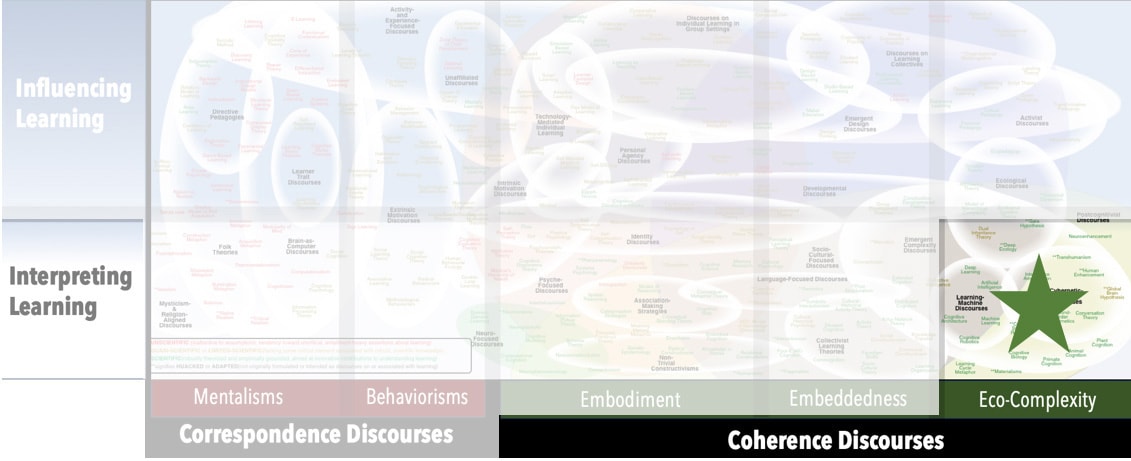AKA
Gaia Principle
Gaia Theory
Focus
Self-maintenance of life on EarthPrincipal Metaphors
- Knowledge is … summed activity of the planetary system
- Knowing is … self-maintenance
- Learner is … the planet (a complex, dynamic system)
- Learning is … evolving and emerging
- Teaching is … systemic feedback
Originated
1960sSynopsis
Authors of the Gaia Hypothesis propose that the interactions of living organisms and their inorganic environments on Earth form a complex (emergent, self-regulating, evolving) system. Importantly, “Gaia” is not seen as an organism, but the system of “organic co-evolving with/in inorganic” – and that system is posited to maintain the conditions for life. Discourses associated with the Gaia Hypothesis include:- Earth System Science – a branch of Earth science that applies the principles of Complex Systems Research to the entire planetary system, in the process combining insights from across climatology, ecology, geography, geology, meteorology, oceanography, and space science – as well as Anthropology, economics, paleontology, and Sociology. Subdomains include:
- Mineral Evolution (Robert Hazen, 2010s) – the application of principles of Universal Darwinism to the creation of different minerals. Mineral Evolution offers an account of the co-evolutions of organic and inorganic aspects of the planet in the realization that the thousands of known mineral “species” can be generated through just a few processes, one of which involves interactions with living organisms.
- Global Studies (Global Affairs) – the study of global power structures, the impact of humanity on the planetary ecosystem, human population dynamics, and other transnational macro-processes
- Systems Ecology – a branch of Earth science that applies the principles of Complex Systems Research to the biosphere. In addition to studying the complex co-activity of biological and ecological systems, the foci of Systems Ecology include impact of human activity and the influence of human interventions in those systems.
Commentary
Many criticisms of the Gaia Hypothesis are focused on early versions (e.g., those that accuse it of being teleological), misconstruals (e.g., those that accuse it of describing the planet as an organism or a neo-Pagan religion), or inappropriate expectations (e.g., demands for explanations of “mechanisms” – a reductionist notion rooted in physics). Most of these concerns have been addressed in current versions of the Gaia Hypothesis. Indeed, most are answered through nuanced explications of complex systems (see Eco-Complexity Discourses). One persistent and resilient focus of criticism is that the Gaia Hypothesis doesn’t offer a comprehensive account of what it is claimed to explain.Authors and/or Prominent Influences
James Lovelock; Lynn MargulisStatus as a Theory of Learning
Within the frame of Eco-Complexity Discourses, learning is understood in terms of ongoing adaptations/evolutions that enable a system to maintain its dynamic coherence within its similarly dynamic circumstances. In that sense, the Gaia Hypothesis is a theory of learning – and humans (individual, communities, the species) are a component of the learning system it describes.Status as a Theory of Teaching
The Gaia Hypothesis is not a theory of teaching – insofar as “teaching” is understood in causal terms. It does, however, afford important insights into how the activities and traits of each component of a system are always and already contributing to the system’s viability. It might be argued that this knowledge should compel all conscious and sufficiently intelligent agents to consider their own roles in “teaching” – i.e., affecting the viability of – the system.Status as a Scientific Theory
While the Gaia Hypothesis continues to have its detractors, it also has an impressive base of supporters. Because the theory cannot be directly tested, its empirical grounding comprises computer-based complex modeling and demonstrated utility in predicting and explaining observed phenomena. On those counts, the Gaia Hypothesis meets our criteria of a scientific theory.Subdiscourses:
- Earth System Science
- Global Studies (Global Affairs)
- Mineral Evolution
- Systems Ecology
Map Location

Please cite this article as:
Davis, B., & Francis, K. (2023). “Gaia Hypothesis” in Discourses on Learning in Education. https://learningdiscourses.com.
⇦ Back to Map
⇦ Back to List
